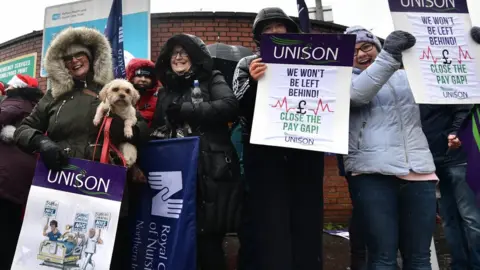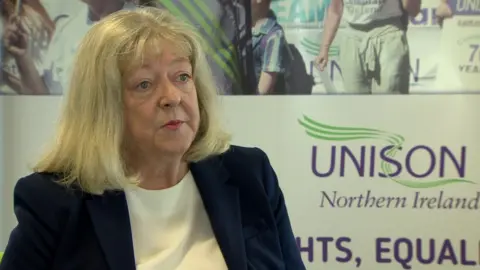Health staff in Unison and Nispa to take industrial action
 Pacemaker
PacemakerHealthcare staff who are members of two of Northern Ireland's biggest unions will begin industrial action on 5 December as part of a dispute over pay.
The move by the Unison and Nipsa unions follows an announcement by the Royal College of Nursing that its members will strike on 15 and 20 December.
Unison said the cost-of-living crisis was "biting deep" and it was "foolish" to assume workers would "suck it up".
Nipsa said the action was "likely to be the strongest ever" by health staff.
A spokesman for Stormont's Department of Health said health authorities would work to protect critical services as much as possible during the industrial action but warned there would "inevitably be an impact on patient care".
Unison members will take action short of strike on 5 December before a one-day strike on 12 December.
Nipsa members will begin "indefinite action short of strike" on 5 December.
Patricia McKeown, Unison's Northern Ireland regional secretary, said action short of strike meant health staff would only work the hours they were contracted to do.
"There are thousands of free hours given by health workers to the system every week," she said.

"People do much more than they are paid to do and we are asking them to stop that.
"They will stop covering for free all the jobs of the people that are currently missing from the system - they will get on with their job.
"Those thousands of free hours that will be missing from the system will have an impact."
Nipsa deputy secretary general Padraig Mulholland said the health service had reached a "tipping point".
"What may appear to be sort of the norm in other jobs is not the norm in the health service and it's an extraordinary state of affairs where people can't even eat their lunch," he added.
'Patients still a priority'
Health workers in Northern Ireland have yet to receive an increase in pay for the 2022-23 financial year.
In July an independent pay review body recommended that they should receive a rise of £1,400.
In England and Wales, NHS staff have been given a rise of at least £1,400.
Unions in Scotland are considering a government offer averaging 7.5% that was made last week.
Ms McKeown said health workers in Northern Ireland did not want to take strike action but felt they had no other option.
She said Unison hoped Northern Ireland Secretary Chris Heaton-Harris would intervene to solve the pay dispute.
Nipsa said 92% of its members who took part in a ballot voted for strike action and 97% supported action short of strike.
Its members are taking the action on three fronts - pay, travel reimbursement and staffing levels within the health service.
'Very difficult winter'
The union said the safety of patients "remains a priority" and it was having discussions with health service employers in order to "take the necessary steps to protect patients during the dispute".
"We'll be engaging with management to ensure that life and limb of the patient is not put at risk by any action that is being taken," Mr Mulholland said.
In a statement, a Department of Health spokesman said Northern Ireland's health and social care system was "planning for a very difficult winter period".
"The Department of Health shares the frustration of Northern Ireland health care staff at the absence to date of a pay award for this year.
"We greatly value our health care staff and very much regret that so many of them believe industrial action is necessary," the statement said.
"In the event of strike action, the department and health and social care trusts will work closely with trade unions with a view to protecting critical services as much as possible.
"However, there will inevitably be an impact on patient care, and further impairment of already highly-pressurised services," it added.
Health staff in Northern Ireland last went on strike in late 2019 and early 2020 in protest over pay and staffing levels within the health service.
